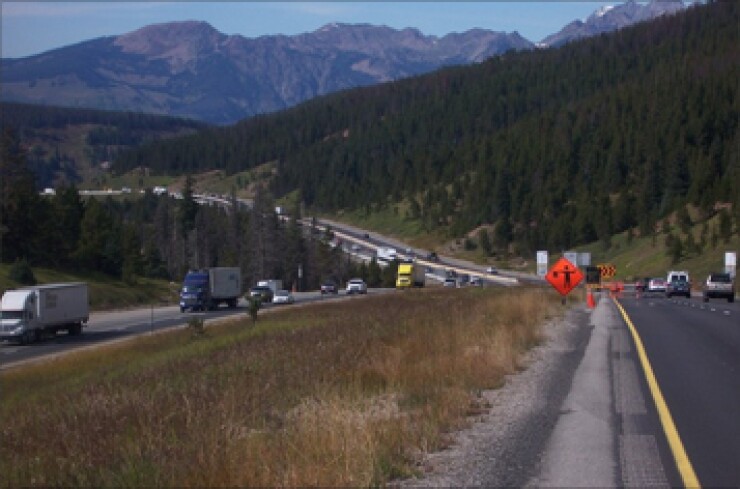
DALLAS – A new tolled express lane on the interstate highway linking Denver with ski and tourist areas to the west seems to be achieving the project's goal of reducing travel times within the congested corridor.
The Colorado Department of Transportation opened the I-70 Mountain Express Lane along a 13-mile segment of eastbound I-70 for service on Dec. 19 and again for three days beginning Dec. 26 after an earlier two-day, no-fee trial period to test license plate cameras and roadside signs that provide motorists with pricing and congestion information.
The toll lane is expected to be operational for 73 days a year, including traffic peaks during ski-season weekends and summer holidays. The lane will revert to its original function as the interior highway shoulder when not needed for congestion relief.
The 13-mile tolled segment between Empire and Idaho Springs will remove a bottleneck in an area of the corridor especially prone to congestion, said Colorado DOT communications director Amy Ford.
Motorists using the toll lane are guaranteed a minimum speed of 45 miles per hour, with a reduced charge if the average speed falls below that. The toll revenue is dedicated to repaying the $78 million cost of the project and for maintenance on the segment.
Vehicles with an express toll tag pay a minimum of $3 for using the toll lane and those without a tag are charged $6.75. The price goes up as the traffic in the two free lanes increases, with a top toll during severe congestion of $30 for tag users and $40 for others.
The typical toll will be $8 to $15, according to Ford. All vehicles, including motorcycles and hybrids, must pay a toll.
The tolls were kept at $3 during the post-Christmas period, Ford said.
"Volumes were a little lower," she said. "Things were moving smoothly, so we just left it at $3."
The express lanes accommodated 400 vehicles per hour on Dec. 26 and 800 per hour the next day, Ford said. The lanes were opened on Dec. 28 as motorists headed into Denver from ski areas.
"We can open it whenever we need to," she said.
The toll lane can handle 750 to 900 cars per hour. Congestion within the corridor becomes significant with 2,000 vehicles per hour on I-70, with stop-and-go traffic occurring when the load reaches 3,000 vehicles per hour.
The express toll lane is part of an overall solution to traffic congestion on the highway west of Denver, said Colorado DOT executive director Shailen Bhatt.
"I-70 in the mountains is only two lanes, and even three lanes are not enough in a growing state like Colorado," he said. "The express lane will bring much needed capacity during peak travel times to this critical mountain corridor that connects our Front Range residents and tourists to our world-class recreational opportunities."
More funding for projects proposed by the Colorado DOT on the I-70 mountain corridor between Denver and the Utah line should be available in the five-year, $305 billion federal transportation measure signed into law in early December (P.L. 114-94), said Rep. Jared Polis, D-Colo.
The segment was designated as a Corridor of High Priority in the transportation bill in an amendment proposed by Polis.
"While this doesn't fix that problem immediately, it's an important first step in freeing up federal funds to help alleviate traffic and congestion, and hopefully make us all a little saner on our mountain getaways," Polis said.





